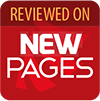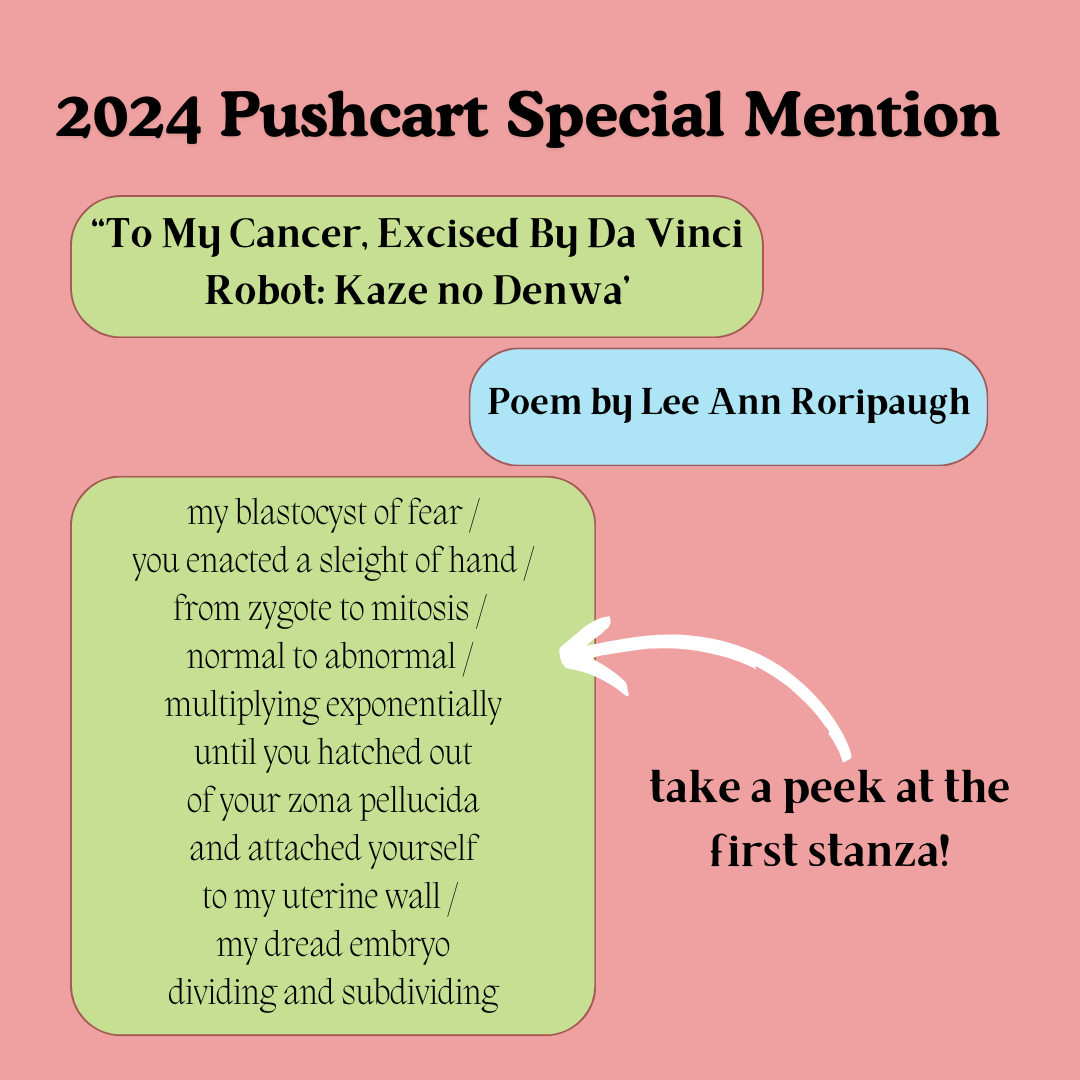 Congrats to Lee Ann Roripaugh for the special mention in the 2024 Pushcart Prize XLVIII Best of the Small Presses! Roripaugh’s poem was originally published in The Florida Review Vol 46.2.
Congrats to Lee Ann Roripaugh for the special mention in the 2024 Pushcart Prize XLVIII Best of the Small Presses! Roripaugh’s poem was originally published in The Florida Review Vol 46.2.
Author: cahcmsadmin
2024 Pushcart Prize Nominations

We are thrilled to announce our 2024 Pushcart Prize Nominations! Congratulations and the best of luck to all!
Introducing Creative Nonfiction Editor Terry Ann Thaxton
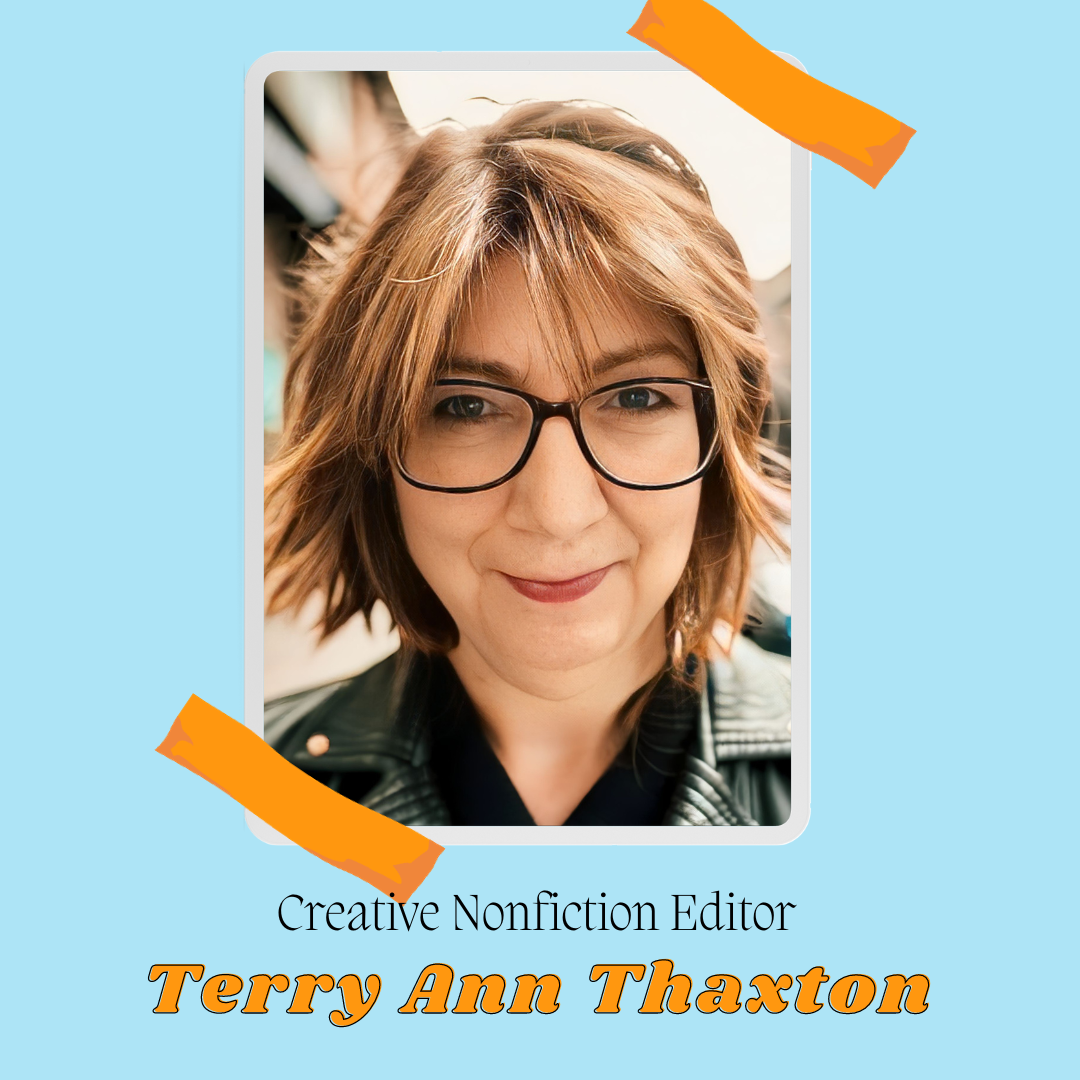 We’re making it official—meet Terry Ann Thaxton, a creative nonfiction editor with The Florida Review. Thaxton joined our team as an editor over the summer, but she’s no stranger to TFR.
We’re making it official—meet Terry Ann Thaxton, a creative nonfiction editor with The Florida Review. Thaxton joined our team as an editor over the summer, but she’s no stranger to TFR.
Thaxton’s poetry and creative nonfiction–rooted in Florida landscape and history–explore the individual’s place in family and community, women’s issues, mental illness, and silenced voices of the past and present. Her books of poetry include Getaway Girl, The Terrible Wife, and Mud Song. She’s been awarded two Florida Book Awards, the Jeffrey E. smith Editors Prize at The Missouri Review for nonfiction, and the T.S. Eliot Poetry Prize. Her poems and essays have been published in Pithead Chapel, New Letters, Chattahoochee Review, Hayden’s Ferry, The Missouri Review, and other literary journals. She has an MA in English and an MFA in Creative Writing. Thaxton is a professor at the University of Central Florida and directs the graduate programs in English.
Announcing Our 2023 Nominations for the Best of the Net Anthology
Aquifer: The Florida Review Online is thrilled to announce the nominations for the 2023 Best of the Net Anthology! The Best of the Net is an anthology created by Sundress Publications that accepts pieces first published online in the categories of poetry, fiction, nonfiction, and art. To read more about the Best of the Net anthology, check out their webpage.
Aquifer receives many wonderful pieces each year, and we are so excited to showcase our 2023 nominations. Best of luck to the nominees!
Poetry Nominations: “Nurture” by Jacques J. Rancourt “Cool Side of the Pillow” by Cynthia Atkins “Blues for King Kong” by Sihle Ntuli “Content” by Allan Peterson “Christmas Eve“ by Chelsea Dingman “Witness Statement” by Kyle McCord
Fiction Nominations: “Junior Steaks” by Anney Bolgiano “75 Simple Steps to Positive, Growing Change” by Andreas Trolf Nonfiction Nominations: “Mythogenesis” by Suzanne Manizza Rosak “What Comes in the Night” by Ariél Martinez Visual Art Nominations: “Heirloom” by Catherine-Esther Cowie “The Queen of All the Dirt” by Catherine Esther-Cowie
Announcing the Winner of the Jeanne Leiby Memorial Chapbook Award
We are thrilled to announce the Winner and Finalists of the 2022-2023 Jeanne Leiby Memorial Chapbook Award! This award celebrates the life and work of Jeanne Leiby (1967-2007) who served as Editor of The Florida Review from 2004 to 2007. The winning entry will be published as a standalone chapbook in April, 2024. To learn more about Jeanne’s legacy, visit our pages here and here. Thank you to all who submitted pieces for consideration.
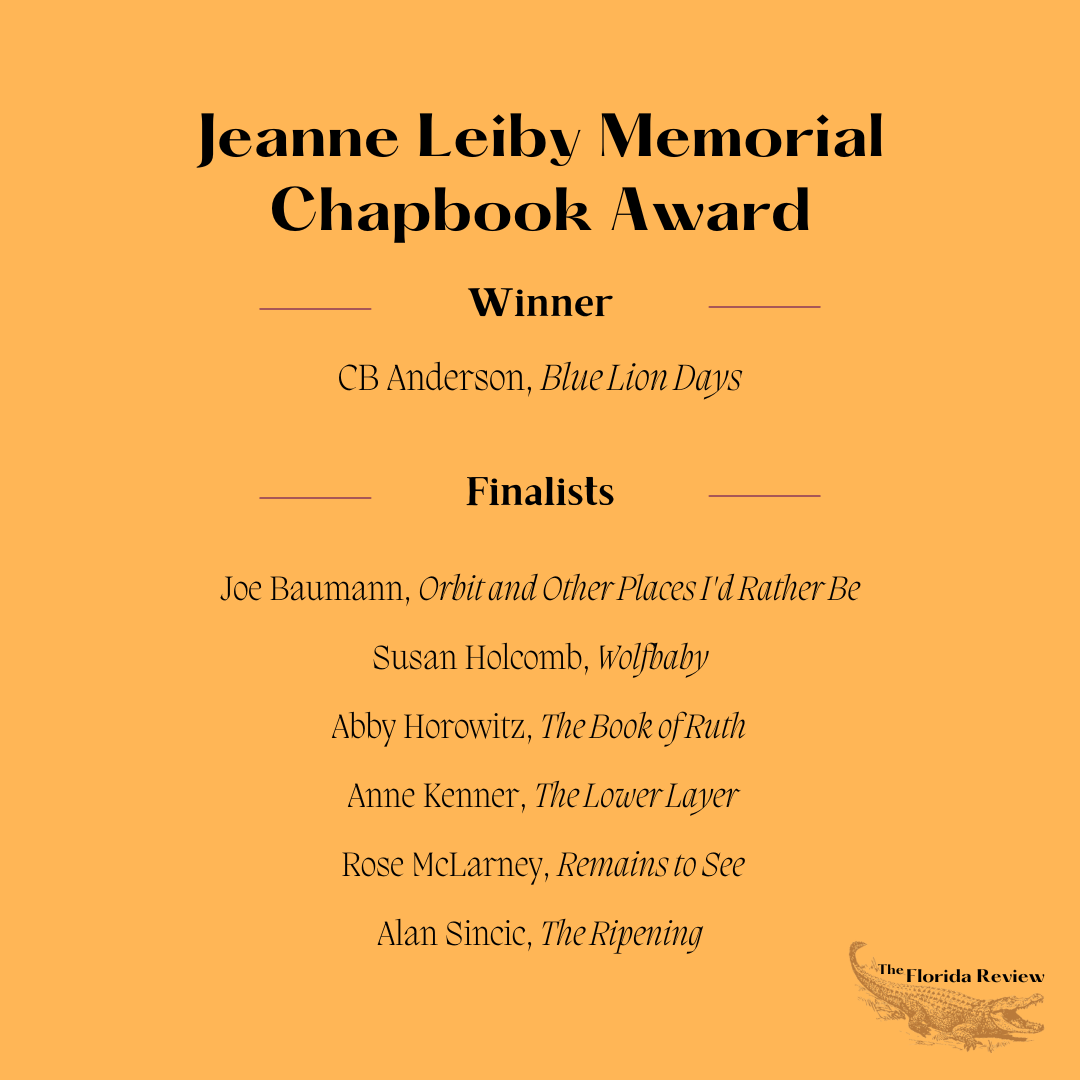
Announcing The Florida Review’s New Editor
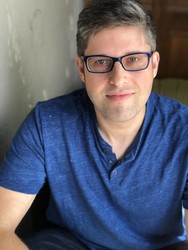 We are pleased to announce The Florida Review‘s new Editor!
We are pleased to announce The Florida Review‘s new Editor!
David James Poissant is the author of the novel Lake Life, a New York Times Editors’ Choice, and the story collection The Heaven of Animals, a finalist for the LA Times Book Prize. He is the former Co-Editor of Sonora Review & the former Fiction Editor of The Chattahoochee Review.
We’re excited to see how Jamie continues to grow and redefine the journal, which has remained a literary biannual in regular print publication since its inaugural issue in 1972.
Announcing the 2022 Humboldt Prize Winner & Runners-Up
The Florida Review is pleased to announce the winner and runners-up for the third annual Humboldt Poetry Prize. The Prize, which is funded by an anonymous donor in honor of Prussian naturalist Alexander von Humboldt (1769-1859), recognizes the best poems with an environmental focus published in the previous year in The Florida Review and on Aquifer: The Florida Review Online. The winner receives an award of $500, and each runner-up $250.
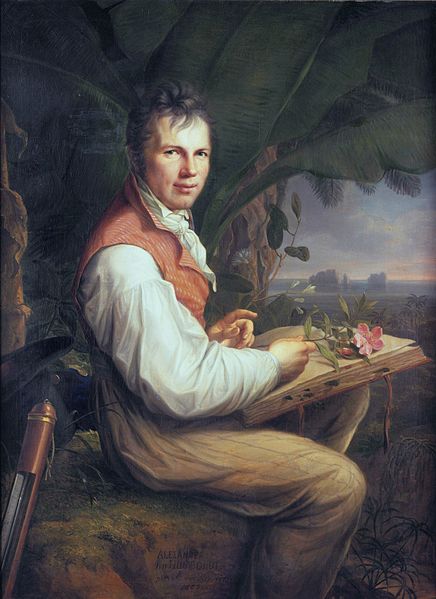
This year’s winner and runners-up are:
- Winner: Zoë Fay-Stindt for “Fall in Languedoc” (Aquifer: The Florida Review Online, March 2022)
- Runner-Up: Madelyn Garner for “Call and Response” (TFR 46.2, Fall 2022)
- Runner-Up: Cole W. Williams for “Sunset” (TFR 46.2, Fall 2022)
- Honorable Mention: Zoë Fay-Stindt for “A Robin at the Bus Station” (Aquifer: The Florida Review Online, March 2022)
The winner and honorable mention will be reprinted in The Florida Review 47.1, Spring/Summer 2023; both runners-up will be republished on Aquifer: The Florida Review online this spring. David Keplinger served as the final judge for this year’s Prize. Continue reading “Announcing the 2022 Humboldt Prize Winner & Runners-Up”
Welcoming Our New Poetry and Fiction Editors!
We are thrilled to welcome to our new Poetry and Fiction Editors! Read more about them and their work below.
 Rochelle Hurt (Poetry Editor) is a poet and essayist. She is the author of three poetry collections: The J Girls: A Reality Show (Indiana University Press, 2022), which won the Blue Light Books Prize from Indiana Review; In Which I Play the Runaway (Barrow Street, 2016), which won the Barrow Street Poetry Prize; and The Rusted City: A Novel in Poems (White Pine, 2014). Her work has been included in Poetry magazine and the Best New Poets anthology. She’s been awarded prizes and fellowships from Arts & Letters, Poetry International, Vermont Studio Center, and Yaddo. Originally from the Ohio Rust Belt, Hurt now lives in Orlando and teaches in the MFA program at the University of Central Florida.
Rochelle Hurt (Poetry Editor) is a poet and essayist. She is the author of three poetry collections: The J Girls: A Reality Show (Indiana University Press, 2022), which won the Blue Light Books Prize from Indiana Review; In Which I Play the Runaway (Barrow Street, 2016), which won the Barrow Street Poetry Prize; and The Rusted City: A Novel in Poems (White Pine, 2014). Her work has been included in Poetry magazine and the Best New Poets anthology. She’s been awarded prizes and fellowships from Arts & Letters, Poetry International, Vermont Studio Center, and Yaddo. Originally from the Ohio Rust Belt, Hurt now lives in Orlando and teaches in the MFA program at the University of Central Florida.
 Brandon Amico (Poetry Editor) is the author of a collection of poetry, Disappearing, Inc (Gold Wake Press, 2019), and the recipient of a 2019 National Endowment for the Arts Creative Writing Fellowship. His poetry can be found in journals and anthologies including The Best American Poetry 2020, The Adroit Journal, Blackbird, Booth, Copper Nickel, The Cincinnati Review, Hayden’s Ferry Review, Hunger Mountain, Kenyon Review, New Ohio Review, New South, Slice, and Waxwing.
Brandon Amico (Poetry Editor) is the author of a collection of poetry, Disappearing, Inc (Gold Wake Press, 2019), and the recipient of a 2019 National Endowment for the Arts Creative Writing Fellowship. His poetry can be found in journals and anthologies including The Best American Poetry 2020, The Adroit Journal, Blackbird, Booth, Copper Nickel, The Cincinnati Review, Hayden’s Ferry Review, Hunger Mountain, Kenyon Review, New Ohio Review, New South, Slice, and Waxwing.
 Blake Sanz (Fiction Editor) is the author of The Boundaries of Their Dwelling, a collection of short stories that won the 2021 Iowa Short Fiction Award. His short fiction has appeared in American Short Fiction, Joyland, Ecotone, Puerto del Sol, and other literary magazines. He and his writing have been featured in Poets & Writers, Electric Literature, and other national forums. Originally from Louisiana, he teaches fiction at the University of Central Florida.
Blake Sanz (Fiction Editor) is the author of The Boundaries of Their Dwelling, a collection of short stories that won the 2021 Iowa Short Fiction Award. His short fiction has appeared in American Short Fiction, Joyland, Ecotone, Puerto del Sol, and other literary magazines. He and his writing have been featured in Poets & Writers, Electric Literature, and other national forums. Originally from Louisiana, he teaches fiction at the University of Central Florida.
Submissions to our 2023 Editor’s Prizes in Fiction, Poetry, and Creative Nonfiction are now open! The winner in each genre will receive $1,000 and publication in the Review. All entries are considered for publication, and all entrants receive a complimentary one-year subscription to the journal, as well as the option to purchase an additional discounted subscription. We thank you for your support of The Florida Review, and look forward to reading your work.
2022 Pushcart Prize Nominees!
Congratulations to our nominees for the annual Pushcart Prize! Our editors are proud to nominate the below poems, short stories, and essay for Pushcart Prize XLVIII:
POETRY
Lee Ann Roripaugh, “To My Cancer, Excised by Da Vinci Robot: Kaze no Denwa”
Teo Shannon, “Trajectory”
SHORT FICTION
Mary Kate McGrath, “Gorgeous Vibrations”
Ellen Rhudy, “Dawn of the New Age”
Austyn Wohlers, “The Archivist”
NONFICTION
Julie Marie Wade, “Story Problems”
Best of luck to these talented writers. Purchase a copy of The Florida Review, or subscribe, to read their fine work!
Announcing the Winners of Our 2022 Editor’s Prizes
We’re pleased to announce the winners, runners-up, and finalists of our 2022 Editor’s Prizes in fiction, poetry, and nonfiction. All winners receive $1,000 and publication in The Florida Review 47.1, Spring 2023.
FICTION:
Winner: Will Berry, for “Buck Velvet”
Runner-up: ”The Point of Indifference” by Matthew Haynes
Finalists: “A Moment of Violence” by David DeGusta & “Saltation and Snow” by Curtis VanDonkelaar
NONFICTION
Winner: Bridget Lyons, for “Rippling Lines”
Runner-Up: “It Takes Pain to Be Beautiful” by Maureen Stanton
Finalist: “Learning to Grieve the Living” by Michelle Polizzi
POETRY
Winner: Jacqueline Schaalje, for “Orca on the Beach (Sijos)”
Runners-up: “Nearing 60” and “My Neighbor’s Blue Jeans” by Tania Rochelle & “On Ice,” “Bedtime Story with Eagle and Sun,” and “Snow Machines” by Bret Shepard
Congratulations to these fine writers, and thank you to all who entered—this year saw many impressive submissions in all categories, and we look forward to publishing several additional entries in upcoming issues of the journal. Next year’s Editor’s Prizes will open for submissions on January 1, 2023. We look forward to reading more incredible work!
Melanie Bishop Wins the 2022 Jeanne Leiby Memorial Chapbook Award
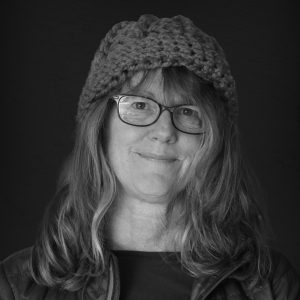
The Florida Review is pleased to announce the winner of the 2021-2022 Jeanne Leiby Memorial Chapbook Award: Melanie Bishop, for Home for Wayward Girls.
Bishop’s chapbook will be released in Spring 2023. The contest was judged by Jill Talbot, whose chapbook A Distant Town: Stories was last year’s winner and is available for sale.
Talbot had this to say about the prize-winning entry:
“It’s after Noreen leaves that my father starts calling our house The Home for Wayward Girls, and we start collecting girls with problems. It’s New Orleans, 1970, and thirteen-year-old Amelia Snyder keeps the secrets of the wayward girls around her and an eye on her father’s drinking. In this beautiful, at times heartbreaking fiction, a family opens their home, already brimming with four daughters and a son, to a girl on the run and a girl in a bad marriage. The young, wise narrator learns about life from the older girls around her—girls who want, but don’t get what they’re after, girls who don’t realize what they deserve. A captivating, tender story that shows how some people rush into our lives as quickly as they rush out, leaving us to wait for the next thing to happen.”
Melanie Bishop is Faculty Emeritus at Prescott College in Arizona, where for 22 years she taught creative writing, and was Founding Editor, and Fiction/Nonfiction Editor of Alligator Juniper, a national literary magazine, three-time winner of the AWP Directors’ Prize. Her young adult novel, My So-Called Ruined Life (2014) was a top-five finalist for both the John Gardner Award in Fiction and CLMP’s Firecracker Awards. Bishop has published fiction and nonfiction in The New York Times, Glimmer Train, Georgetown Review, Greensboro Review, Florida Review, Vela, Essay Daily, Next Avenue, Carmel Magazine, Huffington Post, New York Journal of Books, and Family Circle. Currently, Bishop teaches occasional classes for Stanford Continuing Studies, and offers instruction, guidance and editing through her business, Lexi Services. “Home for Wayward Girls” is the title story of her short story cycle. For more, visit: www.melaniebishopwriter.com
Thank you to the many writers who submitted their strong work for consideration. The full list of finalists is below, and the 2022-2023 contest is now open!
Runner-Up
David Preizler, Racetrackers
Finalists
Jenna Abrams, Mama Shark
Laura Biagi, The Fair Day
Michael Colbert, Sea Monsters
Sharon Hashimoto, Containment and Other Stories
DS Levy, American Fare
David Schwartz, Sleight
Joan Sidney, I Married a Mathematician
Julie Marie Wade and Denise Duhamel, 50 States
2022 Best of the Net Nominees
We are pleased to share our nominees for this year’s Best of the Net anthology. Over the past year, we have published many excellent stories, poems, and essays on Aquifer: The Florida Review Online, from writers emerging and established alike. Click the links below to read each work. We wish our 2022 nominees the best!
POETRY
“Prayer with Burning Barn” by Amorak Huey
“Elegy for Recording the Light” by Erin Slaughter
“If Death Is Another Dimension” by Aruni Kashyap
“Grief is a Sudden Room” by Margaret Ray
“A Patient’s Family Asks What Do I Know” by Eric Tran
“Analog” by Yasmina Martin
FICTION
“The Lunch Party” by Jemimah Wei
“Fugues” by Ruth Joffre
NONFICTION
“Somewhat Involved” by Will Howard
“Mother Tongue” by Pragya Agarwal
Announcing the 2020-2021 Humboldt Poetry Prize Winner & Finalists
The Florida Review is pleased to announce the winner and runners-up for the second annual Humboldt Poetry Prize. The Prize, which is funded by an anonymous donor in honor of Prussian naturalist Alexander von Humboldt (1769-1859), recognizes the best poems with an environmental focus published in the previous year in The Florida Review and Aquifer: The Florida Review Online. The winner receives an award of $500, and each runner-up $250.

This year’s winner and finalists are:
- Lizzie Hutton for “Holiday 2,” winner (TFR 44.2, Fall 2020)
- Margot Douaihy for “The Murder Hornet,” runner-up (Aquifer 7 December 2020)
- Kimberly Quiogue Andrews for “Animal Spirits,” runner-up (Aquifer 23 November 2020)
The winning poem will be reprinted in Aquifer in April of this year; the runners-up will be reprinted in The Florida Review’s Spring 2022 Issue.
This year’s judge was David Keplinger, author of six collections of poetry; winner of Rilke, T. S. Eliot, Cavafy prizes; the Colorado Book and Emily Dickinson awards; recipient of two NEA fellowships; and Professor of English at American University. He had this to say about the winners and runners-up:
Lizzie Hutton’s “Holiday 2” tells a story both inviting and threatening, of a Christmas on the Gulf of Mexico, somewhere in the “cushioned here and now, these privileged / boundaries.” While this world along the shoreline was lavished with gifts and light and merriment, somewhere else a violence was playing out—which moves the speaker to question, with Darwin, the use of poetry. In the end the thing itself, the poem we have of it, affirms something remarkably poignant about knowing things could be otherwise; how the sun and the holiday, for this knowing, assume a more tenuous fragility in the heart.
In Margot Douaihy’s “The Murder Hornet,” the “efficient killer,” the murder hornet, is compared to the enormity of the speaker’s heart. “Size has its advantages,” the poet writes, but the metaphor deepens, and the poem beautifully complicates, as the pull of addiction is soon revealed to be devouring the speaker, rather than any prey. What is stunning here is the moment “the robin / thought I was a chair or tree,” when, in such a state of peace, the heart of devouring disappears, or it expands and expanding becomes a part of everything.
I admire so much the voice of Kimberly Quiogue Andrews’ “Animal Spirits,” which puts me in mind of certain lines of George Oppen I love—I think of “Route”— and the way, reflecting on the old idea that the brain is the seat of the soul, the poet writes, “The brain a bull. The world a bull with its hooves on the world. // O beast that could be gentle. Asleep in the beige autumn of the shaken head.…” What arises in this poem is simultaneously a sparkling intelligence and a sense of history and responsibility, an awareness of the “grinding sludge of machinery” that follows optimism and enterprise in capitalist societies.
Congratulations to the winner and finalists! More info about the prize and its namesake are below.
The Humboldt Poetry Prize
Each year, one winner and two runners-up will be chosen from work published in The Florida Review and Aquifer: The Florida Review Online during the previous calendar year. Candidates will be identified from all categories of works published—those that stem from general and contest submissions, as well as from solicited work that we have published.
Criteria set for the prize include:
- Probing the capabilities and needs of wild animals and challenging their exploitation;
- Exploring wild animal/human relationships;
- Experimenting with and imagining the subjective life of wild animals;
- Interrogating the poetic use of animals simply as metaphors;
- Investigating natural processes, biospheres, and their complexity; and/or
- Pondering awe in the face of nature and/or how to inspire such awe.
Each winner will receive an award of $500; each runner-up an award of $250. In addition, with each poet’s permission (or that of any subsequent book publisher), the poem will be reprinted. Works originally published in Aquifer will be reprinted in the print Florida Review, and vice versa.
Alexander von Humboldt
The new prize commemorates the legacy of the visionary German naturalist and explorer Alexander von Humboldt (1769-1859). Humboldt’s fascination with natural processes started in childhood, when he earned the nickname “the little apothecary” and continued throughout a fifty-year career as a famous public figure, in which he investigated the fields of botany, minerology, geology, isothermal mapping, meteorology, and geodetic and geomagnetic measurement. During the Napoleonic Wars, he set off to explore Central and South America and, with a French botanist, covered 6,000 miles by foot, horseback, and canoe, studying astronomy, topography, flora and fauna, and the Earth’s geomagnetic field and barometric pressure, as well as mapping 1,700 miles of the Orinoco River. They measured the river phenomenon now known as the Humboldt (or Peru) Current.
Humboldt also succeeded in marrying science and aesthetics, promoting the belief that every element of nature is dynamic and interconnected, and that these forces should be apprehended with both head and heart. In thirty volumes published during his lifetime—and filled with detailed illustrations and lyrical descriptions—Humboldt taught that nature, properly understood, stimulates the imagination as well as the intellect and is a source of beauty and consolation. His close friend Goethe noted that “with an aesthetic breeze” Humboldt lit science in a “bright flame.”
As the first scientist to identify climate zones and view the Earth’s ecology as interconnected and ever-changing, Humboldt anticipated the deleterious impact on wildlife and the biosphere, and he frequently decried the careless environmental destruction of Europe in the colonies. Even as his fame and wealth diminished later in life, Humboldt assisted many young scientists in embarking on their careers. References to his ideas appear hundreds of times in Charles Darwin’s writings, and he profoundly influenced John Muir and generations of conservationists and nature writers.
We at The Florida Review hope to continue to encourage those writers concerned with the human relationship with our planet and with the beauty and power inherent in the Earth in the tradition of the writing of Alexander von Humboldt.
2022 Editors’ Prizes Open for Submission!
The 2022 Editors’ Prizes are now open for submission! The Florida Review accepts, each year between January 1 and April 16, submissions to our three Editors’ Awards contests in Poetry, Fiction, and Creative Nonfiction.
Each winner receives publication in the journal and $1,000 (upon publication). All entries are considered for publication. The entry fee includes a 1-year subscription to The Florida Review.
You can find further guidelines and submit your work on our Submittable page.
We’re thrilled to be featuring the 2021 winners and finalists in our upcoming Spring Issue!
PREVIOUS YEAR’S WINNERS:
Fiction:
Winner:
“The Archivist,” Austyn Wohlers
Runners-up:
“Gifted & Talented,” Clancy Tripp
“Marthe, Once Maria: A Story of Murder,” Ann Harleman
Nonfiction:
Winner:
“Good Lands of Mercy,” Lee Gallaway-Mitchell
Runner-up:
“Hero Dreams,” Yiming Ma
Poetry:
Winner:
“Your Bitter Girl,” Morgan English
Runners-up:
“Daguerreotype (n.),” John Sibley Williams
“Days of 1985” & “A Boy’s Own Heaven,” David Groff
2021 Pushcart Prize Nominees!
Congratulations to The Florida Review’s nominees for the annual Pushcart Prize!
The Florida Review
Darius Atefat-Peckham, “I Learn a Language I’m Too Afraid to Speak”
Victoria Maria Castells, “Boy Bands”
Jay Hopler, “love & the memory of it”
Katerina Ivanov Prado, “To Be Good”
Arien Reed, “The Ballad of a Married Trans Man”
MH Rowe, “Vampire Swim”
Aquifer: The Florida Review Online
Jinwoo Chong, “Fish Run”
Ruth Joffre, “Fugues”
Peter Kispert, “The Second Story”
Khalisa Rae, “Full Moon to Monday”
Hannah Stephenson, “Stanley’s Bowl”
Tobey Ward, “Mother Pass”
Jill Talbot Wins the 2021 Leiby Chapbook Award
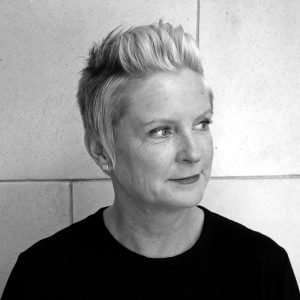
The Florida Review is pleased to announce the winner of the 2020-2021 Jeanne Leiby Memorial Chapbook Award: Jill Talbot, for her short story collection, A Distant Town.
Talbot’s chapbook will be released in Spring 2022. The contest was judged by Coyote Shook, whose chapbook Coyote the Beautiful was last year’s winner and is available for sale.
Shook had this to say about our winner:
“The stories in A Distant Town stayed with me long after I finished reading them. They felt like familiar songs that break your heart by reminding you of the lonely world they exist in, not unlike Crystal Gale or Johnny Cash playing on the radio as one drives over miles of open highway in a western state. I felt like I’d known the author long before I read their work, as though we’d been patrons of the same Christmas-light-decorated roadside bar for years and tipped our glasses to each other even though we weren’t formally introduced. The motif of music and jukeboxes was fitting for this collection, because when the last words evaporated into my mind, I was eager to fish some quarters out of my pocket and hit play again.”
Jill Talbot is the author of The Way We Weren’t: A Memoir and Loaded: Women and Addiction, the co-editor of The Art of Friction: Where (Non)Fictions Come Together, and the editor of Metawritings: Toward a Theory of Nonfiction. Her writing has appeared in journals such as AGNI, Brevity, Colorado Review, Diagram, Gulf Coast, Hotel Amerika, The Paris Review Daily, and The Rumpus and has been recognized four times in The Best American Essays. She is Associate Professor of Creative Writing at the University of North Texas.
The Florida Review congratulates Jill and thanks all the amazing writers who submitted their work. The full list of finalists is below, and the 2021-2022 contest is now open!!
Finalists
Cole Closser, “Too Many Rooms”
Lena Crown, “Dead Coloring”
Soma Mei Sheng Frazier, “Subnivean”
Eleanor Garran, “Against Appearance”
Amina Gautier, “Breathe”
Mark Keats, “Notes for the Afterlife”
Reyes Ramirez, “Brown Eyes, Silver Screens”
Katherine Seltzer, “Amelia”
Kara Vernor, “More Sex”
2021 Best of the Net Nominations!
We’re delighted to share our nominees for this year’s Best of the Net anthology! Thank you so much to all of the amazing authors and artists who have contributed to Aquifer: The Florida Review Online over the past year. We had so many unbelievable pieces to choose from.
FICTION
“The Second Story,” by Peter Kispert
”The Addition,” by Marissa Higgins
NONFICTION
”Mother Pass,” by Tobey Ward
”Mozzy,” by Marisa Crane
POETRY
”There They Are,” by JinJin Xu
”Full Moon to Monday,” by Khalisa Rae
”Longing,” by Okwudili Nebeolisa
”Garbage Day,” by Todd Dillard
”The Night My Numbers Tripled,” by Anne Barngrover
“Person of Interest,” by MICHAEL CHANG
Annual Editors’ Awards 2021 Now Open!
Annual Editors’ Awards 2021 Now Open!
The Florida Review accepts, each year between January 1 and April 16, submissions to our three Editors’ Awards contests in Poetry, Fiction, and Creative Nonfiction.
Each winner receives publication in The Florida Review and $1,000 (upon publication). We also frequently recognize and publish one or more finalists in each genre.
You may also wish to read our general submission guidelines and/or familiarize yourself with our magazine to find out more about what kind of work we publish.
- For prose, submit up to 25 pages (6,500 words) (double-spaced Word doc preferred, but will also accept pdf).
- For poetry, submit up to 5 poems (single-spaced Word doc preferred, but will also accept pdf).
- This is a blind-read contest. The manuscript should have only the title(s) – not the writer’s name or other identifying information on any page. Submit a cover letter (in Submittable) or a cover sheet (if mailed) that includes the manuscript title(s) and the writer’s name, email address, phone number, and mailing address.
- Entry fee of $25 includes a one-year subscription to The Florida Review.
- All submissions will be considered for publication.
- Simultaneous submissions are fine if withdrawn immediately upon acceptance elsewhere.
- Make sure to select the correct contest category in Submittable.
You can find the categories to submit on our Submittable page.
Why do we do this? While the process is gradual and tedious, it is crucial to acknowledge the importance and carefulness of each step in the editorial process and the contributions of those who work within it — writers and editors alike. We appreciate all submissions that we receive here at The Florida Review and welcome diversity, challenges, and risks. We hope to continue to support both the efforts of experienced and emerging writers by providing a platform for them to have their works published.
Environmental Writing & Art Feature Begins!
Today we launch this fall’s special feature, highlighting environmentally themed writing and visual art across Aquifer: The Florida Review Online and our upcoming print issue 44.2. This feature serves to highlight and celebrate the establishment of our Humboldt Poetry Prize for Environmental Writing.
Twice weekly through the end of December, we will be publishing a different piece of environmental work on Aquifer; our print issue features similarly themed work, alongside our usual eclectic mix of fiction, nonfiction, poetry, and graphic narrative. Please consider subscribing to our print magazine if you haven’t already, and check back here as pieces are published on Aquifer every Monday and Wednesday through the end of December.
Schedule of literary features & book reviews to appear in Aquifer (this list will be updated with links on a rolling basis as pieces go live):
Nov. 9: “Notes on Pet Monkeys and How to Manage Them,” Bethany Schultz Hurst
Nov. 11: “Long Marriage” (Parable of the Skull), Doug Ramspeck
Nov. 16: “King Speaking,” Jennifer Perry Steinorth + Richard Widerkehr reviews Patricia Hooper’s Wild Persistence
Nov. 19: “Invasive,” John Sibley Williams + Daniel Lassell interviews Williams
Nov. 23: Two poems, Kimberly Quiogue Andrews + Jada Reyes reviews Andrews’ latest book
Nov 25. “To the Elk,” Jack Cubria
Nov. 30: “Life and Food,” Nayoung Jin + Richard Widerkehr reviews Joseph Strout’s Everything That Rises
Dec. 2: Two poems, John-Michael Bloomquist
Dec. 7: “The Murder Hornet,” Margot Douaihy + Collin Callahan reviews Allison Adair’s The Clearing
Dec. 9: “Evolution Kit,” Mirri Glasson-Darling
Dec. 14: Two poems, Okwudili Nebeolisa
Dec. 16: Three poems, Kelli Agodon
Dec. 21. “The Future is Trashion,” Julie Martin
Dec. 23: Two poems, David Keplinger
Schedule of visual art:
Nov. 9: David Sapp
Nov. 23: Herlinde Spahr
Dec. 7: Lionel Cruet
Dec. 14: Philana Oliphant
Dec. 21: D.C. Lamothe
Announcing the Winners of the 2020 Editors’ Awards
We’re so pleased to announce the winners and runners-up of our 2020 Editors’ Awards in fiction, poetry, and nonfiction. All winners receive $1,000 and publication in The Florida Review; all runners-up also receive publication.
Fiction Winner
“Welcome to the Western Archive of Pre-Awakening Artifacts,” Karyna McGlynn
Fiction Runners-up
”Boy Bands,” Victoria Castells
”Marriage or Wolves,” David Crouse
Nonfiction Winner
“To Be Good,” Katerina Ivanov Prado
Nonfiction Runner-up
“Endurance,” Alison B. Hart
Poetry Winner
”In a Least a Thousand Words,” “As if,” and “The Maker Misgendered,” Michael Mlekoday
Poetry Runners-up
“strange churches I have known” and “Materland,” Kim Garcia
”White Woman,” Erin Hoover
Congratulations to our winners and finalists, and thank you to all who entered—it was an incredibly strong field of submissions, and we will be publishing several additional entries in upcoming issues of the journal. Next year’s contest will open in January, 2021, and we look forward to reading more incredible work!
Coyote Shook Wins the 2020 Leiby Chapbook Contest
The Florida Review would like to announce the winner of the 2019-2020 Jeanne Leiby Memorial Chapbook Award: Coyote Shook, for their graphic memoir Coyote the Beautiful. Shook’s chapbook will be released in Spring 2021.
The contest was judged by Lynne Nugent, whose chapbook Nest was last year’s winner and is available for sale.
Nugent had this to say about our winner:
“This visually inventive and emotionally compelling graphic memoir recounts the experiences of a queer writer navigating a fatphobic society and the slights both outright and subtle that have accumulated throughout their life, including gastric bypass surgery and its complications. Interwoven with references to Talullah Bankhead, Emily Dickinson, My Fair Lady, and other cultural touchstones, this memoir indicts a society that demands conformity to beauty standards at any cost. Coyote the narrator is cultured, funny, defiant—someone who is a delight to spend time with.”
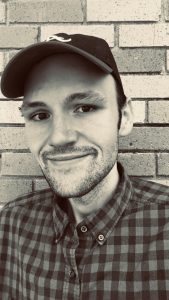
Coyote Shook is a cartoonist and Appalachian expat living in Austin, Texas. They are a PhD student in American Studies at the University of Texas, Austin, where they study comics-as-research, sonic ecologies, and environmental humanities through a critical disability lens. They’re currently working on two graphic novels: the first, Little Debbie Wept: an Appalachian Gastro-Memoir, is an experimental comic that traces their relationship with food, disability, and transgender identity through recipes in their family’s cookbook, and the second, Yellow Birds: a New England History, is a comics-and-sound study of animals, crip-ecologies, and the ghost of Mary Baker Eddy in Shirley Jackson’s, Anne Sexton’s, and Willa Cather’s archival papers and writings.
They hold an MS in English Education from Fordham University and an MA in Gender Studies from the University of Wisconsin, Madison where they completed their first graphic essay: “Crippling Snow: Amputation, Prosthesis, and the Schoolhouse Blizzard of 1888.” They are a Fulbright Scholar (Poland, 2014) and an alumnx of Teach For America. Their comics, essays, and creative writing have appeared in The Wisconsin Review, The North Carolina Folklore Journal, and The Baum Bugle: a Journal of Oz. Most recently, their comic “Flu in the Arctic” was featured by the Society for Historians of the Gilded Age and Progressive Era and is included in the National Humanities Center Digital Library.
Coyote writes about Coyote the Beautiful:
“I cannot adequately describe how humbled and astounded I am with this incredible honor, and would like to dedicate Coyote the Beautiful to Anya Krugovoy Silver, my wonderfully wise and deeply missed friend and mentor who first introduced me to Russian fairy tales and taught me how bitterness and sweetness can co-exist within the magnificent untidiness of a human life.”
The Florida Review congratulates Coyote and thanks all the amazing writers who submitted their work for the past year. We are looking forward to reading all the work that writers are submitting for this year’s chapbook award in the genres of fiction, poetry, nonfiction, and graphic narrative. We hope you make it just as hard for us to choose this year as you did last year. The 2020-2021 contest is now open.
New Editor at The Florida Review
The Florida Review has had many editors over the nearly 50-year history of its publication. Some have served for as many as nine years, others just one, but every editor has left an indelible mark on the literary legacy of The Florida Review.
It is in this context we announce that after five productive, transformative years—years that saw the launch of an entirely new online journal, Aquifer, on which you read this very post—our current Editor & Director, Lisa Roney, will be stepping down as editor. Our new editor, Jake Wolff, author of The History of Living Forever and Assistant Professor in UCF’s Department of English, will assume the editorship on August 8, 2020.
Reflecting on her time as editor, Lisa Roney shares:
“Over the past five years, it has been a great privilege to be editor-in-chief of The Florida Review and to introduce the new website in 2017 as Aquifer: The Florida Review Online. I’m so pleased with the high quality and diversity of the more than 600 writers and artists we’ve published in that time, and I owe a debt of gratitude to all the genre and special editors who have worked faithfully with me during this time—Kenneth S. Hart, Victoria Campbell, Nicole Oquendo, and Mike Shier especially, without whom I would never have been able to survive much less thrive as we have. Many other book review editors, GTAs, MFA interns, and undergraduate interns have also contributed to the success of the magazine during these years. I’m thrilled that Jake Wolff has agreed to take on the role of editor, as I believe he will both continue the 40+-year tradition of TFR at its finest and add his own innovations as well. Fond farewells!”
From Jake Wolff, on assuming editorship of the magazine:
“I’m very lucky to be inheriting a magazine in such fine condition. Over the past five years, The Florida Review has seen a return to consistent, semi-annual publication; a sleeker, more modern redesign of both its print pages and website; its first piece selected for the Best American series; and a dramatic increase in the amount of money we are able to award writers via our various contests and prizes. I hope to continue the magazine’s commitment to diverse voices, both emerging and established, and to championing all of the authors we publish.
Since I like to consider my own work to be a mashup of various genres and forms, I’ll especially be looking for stories, essays, and poems that cross genre lines or disrupt our notion of genre while still communicating deeply felt, deeply urgent conflicts. But most of all, I just want to publish good work.”
Due to production schedules of print and online magazines, Lisa Roney will be co-editing our forthcoming 44.2 issue due for publication this coming December and leaving her editorial mark on the fine work still to be published throughout the fall on Aquifer.
Bidding the fondest of farewells to Lisa, and the warmest welcome to Jake here at The Florida Review.
New Humboldt Environmental Poetry Prize
The Florida Review is pleased to announce a new award focused on poetry with environmental themes and concerns. An anonymous donor is providing funding for the new Humboldt Poetry Prize in honor of Prussian naturalist Alexander von Humboldt (1769-1859). A winner and two runners-up will be chosen each year from work published in the previous year in The Florida Review and Aquifer: The Florida Review Online. Each winner will receive an award of $500, and each runner-up $250.
2019-2020 Recipients
We are also pleased to announce our first-ever winner and runners-up for the Humboldt Poetry Prize:
- Bethany Schultz Hurst for “Notes on Pet Monkeys and How to Handle Them,” winner (TFR 43.2, Fall 2019)
- Doug Ramspeck for “Long Marriage (Parable of the Skull),” runner-up (TFR 43.2, Fall 2019)
- Jacqui Zeng for “Natural Order,” runner-up (Aquifer 25 February 2019)
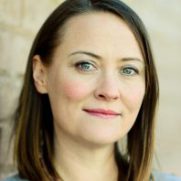

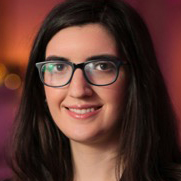
This year’s judge was David Keplinger, author of six collections of poetry; winner of Rilke, T. S. Eliot, Cavafy prizes; the Colorado Book and Emily Dickinson awards; recipient of two NEA fellowships; and Professor of English at American University. About the winning poem, he had the following to say:
Bethany Schultz Hurst’s exquisite response to an 1888 colonialist manual on the “management” of captured animals uses the erasure form in concert with the rigor and formal limitations of the sonnet to study the mistreatment, ailments, and murder (“with an iron bar a sharp and heavy blow”) of the monkey transplanted from its natural environment into a human menagerie, and whose existence there plays out like some profane translation of a sacred text. In the final sonnet in this sequence, the skinning and posturing of the dead conclude with the instruction to “Keep him in full light.” What a brilliant use of artifice to reverse that spell; to bring atrocity to light; to classify the crimes of colonialism; to speak out against what Empire has enacted in the name of power and spectacle.
The Humboldt Poetry Prize
Each year, one winner and two runners-up will be chosen from work published in The Florida Review and Aquifer: The Florida Review Online during the previous calendar year. Candidates will be identified from all categories of works published—those that stem from general and contest submissions, as well as from solicited work that we have published.
The Florida Review was chosen by the donor to administer the Humboldt Poetry Prize due to our long-standing commitment to and appreciation of poetry along environmental themes. We hope that the existence of the prize will encourage even more and stronger submissions of such work, but we chose not to create a separate submissions category for it because we hope not to segregate such submissions. Writers should feel free to identify in their cover letters whether they believe their work includes an environmental component. But all work must first be considered alongside our other submissions and published in the journal before it will be considered for the Humboldt Poetry Prize. Poems will be selected based on the criteria listed above, and an external judge will be selected by the editors to make final decisions.
Criteria set for the prize include:
- Probing the capabilities and needs of wild animals and challenging their exploitation;
- Exploring wild animal/human relationships;
- Experimenting with and imagining the subjective life of wild animals;
- Interrogating the poetic use of animals simply as metaphors;
- Investigating natural processes, biospheres, and their complexity; and/or
- Pondering awe in the face of nature and/or how to inspire such awe.
Each winner will receive an award of $500; each runner-up an award of $250. In addition, with each poet’s permission (or that of any subsequent book publisher), the poem will be reprinted. Works originally published in Aquifer will be reprinted in the print Florida Review, and vice versa.
Alexander von Humboldt
The new prize commemorates the legacy of the visionary German naturalist and explorer Alexander von Humboldt (1769-1859). Humboldt’s fascination with natural processes started in childhood, when he earned the nickname “the little apothecary” and continued throughout a fifty-year career as a famous public figure, in which he investigated the fields of botany, minerology, geology, isothermal mapping, meteorology, and geodetic and geomagnetic measurement. During the Napoleonic Wars, he set off to explore Central and South America and, with a French botanist, covered 6,000 miles by foot, horseback, and canoe, studying astronomy, topography, flora and fauna, and the Earth’s geomagnetic field and barometric pressure, as well as mapping 1,700 miles of the Orinoco River. They measured the river phenomenon now known as the Humboldt (or Peru) Current.
Humboldt also succeeded in marrying science and aesthetics, promoting the belief that every element of nature is dynamic and interconnected, and that these forces should be apprehended with both head and heart. In thirty volumes published during his lifetime—and filled with detailed illustrations and lyrical descriptions—Humboldt taught that nature, properly understood, stimulates the imagination as well as the intellect and is a source of beauty and consolation. His close friend Goethe noted that “with an aesthetic breeze” Humboldt lit science in a “bright flame.”
As the first scientist to identify climate zones and view the Earth’s ecology as interconnected and ever-changing, Humboldt anticipated the deleterious impact on wildlife and the biosphere, and he frequently decried the careless environmental destruction of Europe in the colonies. Even as his fame and wealth diminished later in life, Humboldt assisted many young scientists in embarking on their careers. References to his ideas appear hundreds of times in Charles Darwin’s writings, and he profoundly influenced John Muir and generations of conservationists and nature writers.
We at The Florida Review hope to continue to encourage those writers concerned with the human relationship with our planet and with the beauty and power inherent in the Earth in the tradition of the writing of Alexander von Humboldt.

The Florida Review and Aquifer Author Publications: July 2020
Small literary magazines are integral parts of our writing community, allowing emerging and experienced writers to push their work forward with new experiments in self-expression and creative freedom. Our writers make up that essential part of literary magazines, and we welcome their work and help build writers’ opportunities. Here at The Florida Review, we love to celebrate the successes of our published authors. We encourage you to support the new books of these writers, who have been previously published in our print magazine and/or our online magazine, Aquifer.
Dilruba Ahmed (“’With Affirmative Action and All’” and “View-Master Virtual Reality Starter Pack: Mortality Reel,” Aquifer July 4th, 2017 and Editors’ Award for “Fever,” “Mojlishpur,” and “Clear Water,” TFR 31.2) has a new book of poems, Bring Now the Angels, from the Pitt Poetry Series.
https://upittpress.org/books/9780822966074/
Mary Pauline Lowry (“Texas Teeth,” TFR 42.2) has a new book out as of April 2020. The Roxy Letters (Simon & Shuster) is Lowry’s second novel.
https://www.simonandschuster.com/books/The-Roxy-Letters/Mary-Pauline-Lowry/9781982121433
Michael Hettich (“Shark Valley” and “Love Poem,” Aquifer July 12, 2018; “The Light of Ancient Stars,” TFR 40.2; and “Crows,” TFR 31.2) has a new collection of poems, To Start an Orchard, out from Press 53.
https://www.press53.com/poetry-collections/to-start-an-orchard-by-michael-hettich
Ariel Francisco’s (“On the Eve of the Largest Hurricane Ever Recorded My Ex Tells Me She Hopes I Don’t Die and, I Mean, Whatever,” TFR 42.2) collection of poetry, A Sinking Ship Is Still a Ship, is out in spring 2020 from Burrow Press.
Paige Lewis (Editors’ Award 2016 with “Angel, Overworked” in TFR 41.1) has her first collection of poetry, Space Struck, out from Sarabande Books.
http://www.sarabandebooks.org/titles-20192039/space-struck-paige-lewis
John Sibley Williams (“Hekla (Revised),” TFR 42.1) won the Orison Poetry Prize, and his collection of poetry, As One Fire Consumes Another, was published by Orison Books in 2019. We have an interview with him and another poem forthcoming in Aquifer later this month.
https://www.orisonbooks.com/product-page/as-one-fire-consumes-another-poems-by-john-sibley-williams
Miriam Cohen (“Recess Brides,” TFR 40.1) recently released her first collection of stories, Adults and Other Children, from Ig Publishing, including a reprint of “Recess Brides.”
2019 Pushcart Prize Nominations
We are so excited to announce our 2019 Pushcart Prize Nominations for The Florida Review and Aquifer! Congratulations to the nominees!
Pushcart Prize Nominations for TFR
Amanda Hawkins, “/in the year of salt and death/” (43.1)
Nahal Suzanne Jamir, “That He Had a Father” (43.1)
Jayson Iwen, “Body: Luke & Acts” (43.2)
Hadara Bar-Nadav, “[Your mind is night]” (43.2)
Kass Fleisher, “When They’re Two” (43.2)
Jessica Treadway’s “Infinite Dimensions” (43.2)
Pushcart Prize Nominations for Aquifer
Richard Froude, “Some Trees: An Incidental Elegy”
Trinity Tibe, “Father Tongue”
Luke Johnson, “This is what it looks like, son”
Thomas Barnes, “Delivery”
Afua Ansong, “Things You Left in Accra before Moving to the Bronx”
July Westhale, “Milk Glass Serenade”
Erasure Special Feature Begins!
We’ve now launched this fall’s special feature, highlighting innovative hybrid and erasure work across Aquifer: The Florida Review Online and our upcoming print issue 43.2. Twice weekly through December 26, 2019, we will be publishing a different piece of erasure work on Aquifer, with each taking advantage of the web-native format that enables us to publish genre-bending work we simply couldn’t present accurately in print. Our print issue, no less innovative (though maybe less colorful), will feature even more erasure work that challenges the norm and speaks to the topical origins and traditions of this resilient form. Be sure to subscribe to our print magazine as soon as possible if you haven’t already, and check back here as pieces are published on Aquifer every Monday and Thursday through the end of December.
Over the past fifty years, erasure has come to be known as a (mainly) poetic technique that both connects the writer/reader with an original text and also questions and transforms it, sometimes evokes a completely contrary meaning. As a form, it draws attention to writing as a “physical” object (or, more recently, as a digital object) and makes us aware of how all writings’ meanings can shift and change with varied attention and assumptions. It connects us to our literary and extra-literary writing and visual arts traditions while creating a contemporary engagement with subjects and words from works both ancient and recent. We are pleased to present in Aquifer and the print Florida Review a wide range of erasure techniques from blacking out, crossing out, blanking out, painting out, burning out, and creating collages from original material both written and visual.
Aquifer Erasure Publication Schedule:
(Links inactive until posted publication date at 8:00AM, EST)
“Selections from VIOLETS” by Austin Rodenbiker – Live 11/11
“The Mueller Report, Vol. 2, Page 147 Fairy Tale” by Ronnie Sirmans – Live 11/14
“Of extinction” by Holly Burdorff – Live 11/14 (in our Multimedia Features)
“November Nineteenth [On Erasure]” by Amanda Moore – Live 11/18
“Seduction” by Lynn Domina – Live 11/21
“Wory Gardn” by Harrison Candelaria Fletcher – Live 11/25
“Plum Trees, Astray, Verso, A Little Croquis, and Snow Still” by Jayne Guertin – Live 11/28
“Two Erasures” by Zebulon Huset – Live 12/02
“To All Whom It May Concern” by Julie Jones – Live 12/05
“Four computer-generated erasures” by S Cearley – Live 12/09
“Insect Erasures” by Jaime Zuckerman – Live 12/12
“Three Poems from Time Life’s North American Wilderness Series” by Allyson Young – Live 12/16
“Season Cluster” by Sara Biggs Chaney and Michael Chaney – Live 12/19
“Two Bible Stories” by Caleb Curtiss – Live 12/23
“Healthful Living” by Maud Kelly – Live 12/26
Forthcoming Erasures in 43.2 of The Florida Review:
Sea Poems by C. R. Resetarits
“[your mind is night],” “[The animal is chemical carnivorous sick],” “Read this each time you],” and “[Life eats breath]” by Hardara Bar-Nadev
“Seance” by Jay Barnica
2 poems from Each Leaf by Anna Lena Phillips Bell
“In the house of” by John Bonanni
“Jefferson’s Secret Message to Congress (Redacted)” by Alan Elyshevitz
“Self-Erasure for My Mother” by Amanda Hadlock
“Notes on Pet Monkeys and How to Manage Them” by Bethany Shultz Hurst
“Body: Luke & Acts” by Jayson Iwen
“Come Gentle” and “Come Hollow” by Carolyn Janecek
“Apollo & Daphne” by Eva Della Lana
“Boys, Boss” by Kristine Langley Mahler
“After a Death” and “Allegro” by Kelly Nelson
“Hell’s Our Destination” by David Rachels
“My Girlfriend Asks if I Think I’ll Ever Stop Writing about My Ex” and “Ars Poetica in War Time Which for Us Means Always” by Dujie Tahat
Lynne Nugent Wins the 2019 Leiby Chapbook Contest
The Florida Review would like to announce the winner of the 2018-2019 Jeanne Leiby Memorial Chapbook Award: Lynne Nugent, for her collection of creative nonfiction shorts, Nest. Nugent’s collection will be released at AWP in 2020. Final judge Phong Nguyen had this to say about our winner:
Nest achieves what many essay collections seek to accomplish: it causes the reader to see the world with new eyes. By drawing upon the raw material of motherhood, the author uses this eternal verity and imbues it with her highly idiosyncratic reality, without ever forcing revelations onto this universal subject. The insights that emerge from her telling feel at once natural, inevitable, and sui generis.
Lynne Nugent is the managing editor of The Iowa Review. Her personal essays have been published in the North American Review, Brevity, the New York Times, Full Grown People, Mutha Magazine, and Hippocampus Magazine.
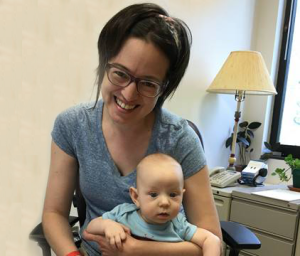
She noted about Nest:
I wrote most of the essays in Nest on my phone while breastfeeding or holding a sleeping baby, intoxicated by love and pheromones but also exhausted and bored, and swinging between those two emotional extremes and needing an outlet. Given the constraints of this kind of writing process, most of them are flash essays, and the overall length of the manuscript is pretty lightweight. Rather than push myself to fit some idea of how long an essay or a book can be, I took inspiration from Sarah Ruhl’s 100 Essays I Don’t Have Time to Write, in which she embraces the fragmentary and incomplete thoughts that can result from motherhood and, well, just life… One thing I didn’t anticipate was the positive reaction to writing a chapbook, not in spite of but because of its brevity: a friend who was also a new mom said, “Thank you for writing something I will actually have time to read.” So the benefits can be to both reader and writer. I see Nest as a product of a moment—technology, feminism, creativity, and ambition, all intersecting with the eternal needs and rhythms of life, especially for those of us involved in taking care of other humans.
We would also like to announce our semi-finalists: My Tran for her three flash fiction pieces, “eleven,” “thirteen,” and “seventeen,” from “My father is housed in a whale,” and Angelo R. Lacuesta and Roy Allen Martinez for their graphic narrative, “Bedweather.” A second short piece by Angelo R. Lacuesta and artist Shaira Luna, “Triple Phantasy,” will appear in Aquifer: The Florida Review Online.
Once again, we would like to say thank you to all the amazing writers who submitted their work for the past year. We are looking forward to reading and seeing all the work that writers are submitting for this year’s chapbook award in the genres of fiction, poetry, nonfiction, and graphic narrative. We hope you make it just as hard for us to choose this year as you did last year. The 2019-2020 contest is now open.
Meek Awards for 2018!
We’re happy to announce the winners of our Meek Awards for the 2018 publication year. Congratulations to all of these artists and writers whose work was chosen from among all the work we publish from general submissions–these works are not from contests or solicitations, but straight out of the “slush pile,” and they represent some of the finest work we published last year. We’re thrilled to be able to compensate some of our writers through a generous donation. This year’s winner are:
Poetry—Alana de Hinojosa, “Sombras nada mas” (42.2)
Fiction—Janelle Garcia, “A Warning” (Aquifer)
Creative Nonfiction—Christopher Citro, “Root That Mountain” (42.2)
Graphic Narrative—Peter Witte, “After Kafka” (Aquifer)
Digital Media—Mark Keats, “Surnames” (Aquifer)
Short Film—Gloria Chung, “MEMORY VI: An Ostrich’s Eye Is Bigger Than Its Brain” (Aquifer)
Visual Art—Michael Hower, “Redemption” (Aquifer)
We’re publishing more great work all the time, and we extend our appreciation to all of our writers and submitters. Keep up the great work!
The Meek Awards NEW at TFR
We’re a bit late in getting this news on the website, but we’re proud to announce that a new donor has made it possible for us to select one author or artist (or to split the award between two) in each of our publication categories each year. These writers and artists are some of those who come to us through general submissions rather than contests or other means. At The Florida Review, we recognize that writers deserve to be paid for their work, and, though it remains financially impossible for us to provide remuneration for every writer and artist, we are happy that now every writer who submits to The Florida Review and Aquifer has at least the possibility.
For the inaugural 2017 year, we selected the following writers and artists for this special recognition. They represent the kind of work we love to publish at The Florida Review and Aquifer–both personally moving and aware of the wider world.
- Esteban Rodriguez (“Roadside,” 41.2) and Sherrie Fernandez-Williams (“the crossing,” Aquifer) for poetry
- Laura Farnsworth (“Salvio: A Short Story,” Aquifer) for fiction
- Re’Lynn Hansen (“The Han Gan,” 41.1) for nonfiction [also recipient of recognition as a Notable Essays in The Best American Essays 2018]
- Aubrey Hirsch (“The Language of Trauma,” 41.1) for graphic narrative
- Hannah Kaplan (“Dear Doctor,” Aquifer) for digital/electronic story
- Jave Yoshimoto (“Meditation on the Purpose of Art Making,” Aquifer) for visual art
Congratulations to these and all of the other wonderful writers and artists we publish. In 2018, we will be adding a winner in the short film category as well, and look for that announcement sooner than November!
MR Sheffield Publishes Debut Book
The Florida Review is thrilled to share that MR Sheffield, one of our authors, has just published her first poetry collection: Marvels. Sheffield’s fiction piece “The Geometry of Children” was a Jeanne Leiby Chapbook Contest finalist and featured in our print issue 37.1 from summer 2012. When asked about being published in The Florida Review, Sheffield said:
I was thrilled to be a part of such an esteemed publication. As a chapbook finalist, part of my prize was getting to attend the [Sanibel] writers’ conference. It was just a fabulous experience—it was the first time I felt like a writer. While I’ll probably never be completely rid of self-doubt, publishing my story helped me see that I might actually have something to say.
Since she had been published in The Florida Review, Sheffield noted a sense of legitimacy that was gained for her as a writer and outlined what she sees as the role of small literary magazines:
They are the rich earth wherein stories, poems, and essays can take root. They give emerging authors a place to grow from. Small literary magazines also shape contemporary literature. We can see where trends are going through what pops up in these publications.
As far as whether her life has changed as a writer now with the release of Marvels, Sheffield said:
Again, I’ve had this fleeting sense of legitimacy. I actually do love this little book. It’s weird and complicated and in some ways it’s indistinguishable from me. I love that it will exist outside of me. My dad passed away last year, and this book feels like another scattering of his ashes.
Marvels can be pre-ordered from Sundress Publications here.








